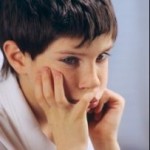Bipolar Conduct Disorder In Children
 Bipolar conduct disorder in children is a serious problem. Those effected with this problem face extreme mood swings, in a moment they are aggressive and over active other moment they go passive and start feeling depressed. This problem is also called ‘bipolar affective disorder’ or ‘manic depression’. This is very similar to ‘bipolar mood disorder’ symptoms in children.
Bipolar conduct disorder in children is a serious problem. Those effected with this problem face extreme mood swings, in a moment they are aggressive and over active other moment they go passive and start feeling depressed. This problem is also called ‘bipolar affective disorder’ or ‘manic depression’. This is very similar to ‘bipolar mood disorder’ symptoms in children.
In such children there are often episodes of abnormally elevated energy levels, cognition, and mood with or without one or more depressive episodes. In medical terms elevated moods is called mania or hypomania. These mood swings are often separated by periods of normal mood but, in some individuals, depression and mania may rapidly alternate. Extreme cases can sometimes lead to symptoms of delusions and hallucinations.
Data show that about 5% of the total children are suffering from such disorder of different types. Full symptoms generally occur when the child is about to complete age of adolescence or when he enters adulthood. For proper diagnosis of this problem the child or the parents have to give full details to the physician. Episodes of abnormality are associated with distress and disruption. In extreme cases there are increased chances of the child committing suicide especially during depressive period. In some cases, it can be a long-lasting disorder.
It is not that the patient is only depressed in some cases it has also been associated with creativity, goal striving, and positive achievements. There is significant evidence to suggest that many people with creative talents have also suffered from some form of bipolar disorder. A child suffering from this disorder when in normal mood is unable to understand as to why he behaved in a particular manner during the time he is affected. Counseling does help but may take a long time for the child to understand.
Genetic factors significantly contribute to the likelihood of developing bipolar disorder. Also the environment in which the child is brought up has an effect on the child. It is possible to treat bipolar disorder, for this mood stabilizing medications and, sometimes, other drugs are also given to the child. Psychotherapy also has a role to play to reduces extreme swings.
In serious cases where there is a risk of harming oneself or others, forced isolation can be an option to be exercised cautiously. These cases generally involve cases involving severe manic episodes with dangerous behavior or depressive episodes with suicidal tendency. It is essential that the child or person with bipolar disorder showing psychotic symptoms should be properly diagnosed by an expert as sometimes this problem can be misdiagnosed as serious mental illness.
The term bipolar disorder has recent origin and refers to the cycling between high and low episodes.